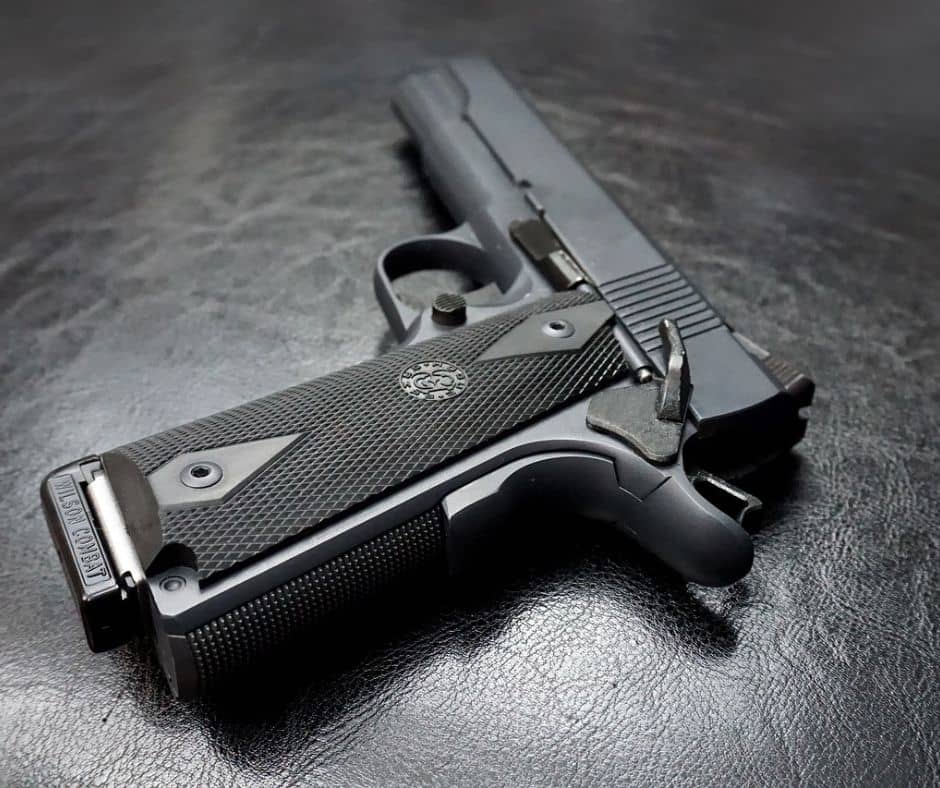What Does a Gun Background Check Show?

So, you’re thinking about buying a gun and want to know what exactly a background check entails. As weapons charges lawyer practicing in North Carolina, we totally understand the desire to be informed before exercising your Second Amendment rights.
A background check can seem mysterious if you’ve never gone through one. Our goal is to shed some light on the process, the various databases searched, what would cause you to fail, and more.
It’s the Law: Licensed Dealers Require Checks
Under federal law, any licensed gun dealer is required to complete a background check before the sale of a firearm. This applies whether you’re buying at their brick-and-mortar shop or an online store. The background check requirement has been in place since the Brady Handgun Violence Prevention Act was passed in 1993.
When you attempt to purchase a gun from a licensed dealer, they have to submit your personal information to the National Instant Criminal Background Check System (NICS). This returns either a “proceed,” “denied,” or “delayed” response. About 90% of checks return an immediate “proceed,” allowing the sale.
But Not All Sales are Covered: The “Gun Show Loophole”
There is one glaring exception that you may have heard referred to as the “gun show loophole.” Under federal law, background checks are only required when dealing with a licensed gun dealer. Private individuals can sell guns to another private party without any background check or paperwork. That’s where the “loophole” comes in.
About 22% of gun owners report obtaining their most recent firearm without a background check. This “private sale exemption” enables prohibited individuals to buy guns easily at things like gun shows or online. However, several states have passed laws mandating background checks for all firearm sales to close this federal loophole. We’ll discuss state differences further shortly.
What’s Searched in a Background Check Database?
When a dealer runs a background check, your information is searched across a few different databases compiled by the FBI and Department of Justice. Specifically, they search the NICS system, which draws from the following:
Criminal History and Warrants
Any felony convictions or misdemeanor domestic violence charges will show up here. Active warrants for your arrest will also be revealed.
Mental Health Adjudications That Prohibit Gun Ownership
If a court or other lawful authority has determined you’re a danger to yourself or others or lack the mental capacity to manage your own affairs due to marked subnormal intelligence or mental illness, injury, or disease, that will appear here.
Restraining and Protective Orders
Any current restraining or emergency protective orders against you that prohibit firearm purchase or possession will also show on your background check.
Drug Use and Dishonorable Discharges
If you are addicted to any controlled substance or have dishonorable discharges from the military, it will also prevent you from passing a background check.
Immigration Statuses Prohibiting Gun Ownership
Individuals unlawfully present in the United States are also prohibited from owning firearms and would fail a background check.
As you can see, the databases tap into criminal history, mental health issues, substance abuse, military service, and immigration status. But what about a speeding ticket or parking violation?
Traffic Violations Don’t Matter for Gun Background Checks
We know searching through government records can be intimidating! But when it comes to a standard firearm background check, you can breathe easy when it comes to minor driving offenses. Things like speeding tickets, parking tickets, DUIs, and accident history are not part of the background check.
The only exception would be for someone applying for a firearms dealer license with the ATF. Since dealers need to transport firearms, the ATF does check Department of Motor Vehicle records for commercial driving disqualifications that would prohibit safe transport. But again, for a standard gun buyer background check, your driving record doesn’t matter.
Denied Firearm Sales and The Appeals Process
Let’s switch gears and discuss what happens when a background check results in a denial. If there’s a questionable felony conviction or mental health adjudication popping up that you don’t think should disqualify you, there is an appeal process. But first, understand why formal appeals are necessary rather than simply asking the dealer to re-run the check.
Once a denial appears in the system, it triggers notifications to both local law enforcement and the ATF. The authorities are alerted to prevent an attempted illegal firearm purchase. If the dealer simply re-ran your check over and over until you got a proceed, the denial notification would continue getting sent out, wasting law enforcement resources.
Instead, you can submit an official appeal to the FBI’s NICS Section. They will take a closer look at your specific prohibiting records that caused the denial. If any records are found invalid, they will reverse the decision and clear you to legally purchase firearms going forward.
Do Background Checks Save Lives and Reduce Gun Crime?
It’s a polarizing question with passionate opinions on both sides. Since background checks were federally mandated in the 1990s, over 3 million prohibited firearm purchases have been blocked. Clearly, high-risk individuals are being prevented from legally obtaining guns in many cases.
However, studies diverge when it comes to quantifying the reduction in gun crime and violence attributed to background checks. Critics of mandated background checks point to the fact that criminals rarely obtain guns legally anyway. But also consider that with enough time and attempts, even flagged individuals could eventually buy from an unknowing private seller.
Our view is that background checks are likely one piece of the puzzle when it comes to reducing gun violence on a macro scale. Universal background checks closing the private sale loophole could potentially have the greatest impact. There are also additional gun law measures beyond just checks that require consideration as part of a comprehensive public safety approach.
How Far Back Does The Background Check Go?
A common question we get is how far back the background check goes when screening for prohibiting records. The FBI’s NICS system reviews eligibility based on current and recent events that would prevent someone from purchasing guns legally.
For most criteria, the lookback period is typically around 5 years. However, some disqualifying events remain permanent. Let’s break it down further:
- Felony Convictions – Any felony conviction at any point will cause you to fail a gun background check, no matter when it occurred. Felonies do not expire when it comes to firearms prohibitions.
- Misdemeanor Domestic Violence – These types of misdemeanor convictions prohibit legal gun ownership for life as defined under the Lautenberg Amendment. There is no expiration after 5 years like other misdemeanors.
- Mental Health Adjudications – If a court deems you a threat to yourself or others or incapable of managing your own affairs, that results in a lifetime prohibition on buying guns. However, the lookback is 5 years for voluntary mental health admissions.
- Restraining Orders – Only current restraining orders of any kind that specifically prohibit the possession of firearms will cause you to fail a background check. Once the order expires, the prohibition is lifted.
- Drug Offenses – Unlawful drug use or addiction within the past 5 years will show up. However, a conviction for drug possession over 5 years ago would not block a firearm purchase.
- Misdemeanors – Most misdemeanors convictions, such as DUI or petty theft, only prohibit legal gun ownership for 5 years after the conviction.
The FBU uses the 5-year review period as a window where prohibiting events are recent enough to accurately reflect your current eligibility to legally purchase firearms. Events older than 5 years are considered too far in the past to warrant continued denial of gun rights.
Preparing Yourself for a Smooth Background Check
The more prepared you are in advance, the smoother the licensed firearm purchase process will be. Here are some tips:
- Know your personal history thoroughly – Review your records so any prohibiting events are expected if they turn up.
- Gather supporting documents – For a denied appeal, provide court records showing charges were dismissed, orders expired, etc.
- Contact courts beforehand – If needed, get matters fully expunged or seek an early termination of probation.
- Consult an attorney – If you have complex records, we can advise on options to lift prohibitions.
- Ask the dealer to note delays – If you get a delay rather than a proceed, the dealer can note that NICS didn’t meet the 3-day deadline.
- Remain calm and cooperative – Don’t get frustrated with the dealer if you get denied. It’s their legal obligation.
Taking these steps allows you to present yourself to the dealer as an informed buyer who is respectful of the background check process. That smooths the experience for all parties involved.
Let’s Discuss Your Second Amendment Rights
Exercising your Second Amendment rights comes with great responsibility.
If you have any other questions, don’t hesitate to reach out to discuss your concerns. At McMinn, Logan, and Gray PLLC we’re here to help inform and protect the rights of responsible gun owners in North Carolina.
